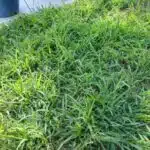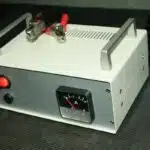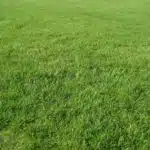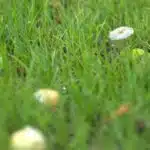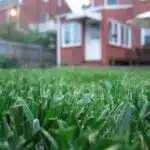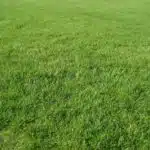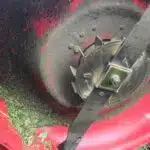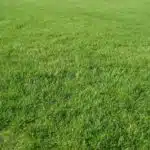The garden is a place of beauty and life, but it can also be a battleground between plants that you have nurtured and those that have invaded your space. Weeds are persistent intruders, and they will do whatever they can to take over your garden. Vinegar has been touted as an effective way to control weeds, but can this seemingly innocuous ingredient really provide the results you seek?
Vinegar may seem like a harmless solution for weed control, but this potent liquid can be dangerous when used without caution. From burning plants to killing beneficial organisms in the soil, vinegar carries with it several risks that should not be ignored.
By understanding how vinegar works as a weed killer and how it could potentially damage your garden, you can make an informed decision about using it in your space. Learn why it can be dangerous to use vinegar to kill weeds and find out if there are safer solutions available.
What Is Vinegar?
Vinegar is a liquid consisting of acetic acid and water. It’s commonly used as a condiment or for pickling, but it can also be used for cleaning, in beauty treatments, and as an effective weed killer. Vinegar is most commonly made from the fermentation of ethanol in a process known as acetous fermentation.
When used as a weed killer, vinegar works by breaking down the cells that make up the plant’s leaves and stems. This causes them to dry out and die. The effect is temporary though, so you have to reapply frequently in order to keep weeds at bay. Additionally, because vinegar doesn’t distinguish between weeds and other plants, it can also kill beneficial vegetation if it gets too close to them.
Vinegar is an all-natural option for killing weeds, but its effectiveness comes with potential risks. Without careful application, vinegar could end up damaging other plants or even the soil itself. For this reason, it’s important to use caution when using vinegar to kill weeds in your garden or lawn.
Benefits Of Using Vinegar To Kill Weeds
Using vinegar to kill weeds can be beneficial in many ways: it’s natural, inexpensive, and quick. As a natural weed killer, vinegar is not only harmless to the environment but also friendly to wildlife too. By spraying vinegar onto the targeted area, you can quickly see results—without having to wait days or weeks for other chemical treatments to work.
When compared with other products on the market, vinegar as a weed killer works just as well and sometimes even better than commercial herbicides. It’s also easy to use; all you need is some white or apple cider vinegar, a spray bottle and a few minutes of your time. Plus, no special skills are needed: even novice gardeners can easily use this natural solution to keep their lawns and gardens looking great.
Vinegar may be a convenient weed killer option but its effectiveness has led some people to overuse it without considering potential risks. In the next section we will explore those risks in more detail.
Potential Risks Of Using Vinegar To Kill Weeds
Vinegar has been hailed as a miracle cure for so many gardening woes, but we must be careful of its drawbacks before we douse our beloved plants. When it comes to killing weeds, vinegar may not be the safe and effective solution you think it is. Let’s take a closer look at the potential risks of using vinegar to kill weeds.
Using vinegar as a weed killer can have serious consequences on your garden. This acidic substance can burn and damage both your plants and soil, making them unable to support healthy vegetation in the future. Additionally, vinegar does not discriminate between good and bad plants; while it may kill your weeds, it could also destroy the flowers or vegetables you’ve worked hard to grow!
Moreover, there is a chance that when exposed to direct sunlight, vinegar could become volatile and cause skin irritation or even blindness if sprayed directly into eyes – definitely not worth taking that risk! Therefore, we should always use caution when using vinegar for weed control. In short: proceed with care!
How Vinegar Works As A Weed Killer
Vinegar is a popular choice for killing weeds, but how does it work? To understand, let’s consider the case of John, who wanted to get rid of the weeds in his garden. He decided to try using vinegar as a weed killer.
Vinegar is an acid and works by burning the foliage of weeds. It is especially effective on young or small weeds that have not yet had enough time to develop deep roots because it only kills the parts of the weed above ground. When applied directly to a weed, vinegar can cause its leaves to wilt and die within hours or days.
The thing about vinegar is that it doesn’t discriminate between weeds and other plants. This means that if you’re not careful about where you spray, your flowers or vegetables could suffer unintended damage from the vinegar. Additionally, because vinegar will kill any plant matter it comes into contact with, you have to be careful not to let it run off onto other areas of your lawn or garden where you don’t want anything killed.
Vinegar certainly has potential when it comes to killing weeds – but there are some risks associated with its use as well. Now we know how it works, let’s look at whether it is an effective weed killer.
Is Vinegar An Effective Weed Killer?
Vinegar has been used as an effective weed killer for many years. It’s acidic nature breaks down waxy cuticles on the weed leaves and kills them off, but it also kills beneficial plants in the process. That’s why it’s important to take caution when using vinegar as a weed killer and make sure to only use it in targeted areas.
But is vinegar really an effective way to get rid of weeds? The answer is yes, it can be if applied correctly. Vinegar needs to be sprayed directly on the weed and left for a few hours before rinsing off or wiping away with a cloth. If you don’t take this step, it won’t do much damage to the weeds, so accuracy is key here.
The effectiveness of vinegar as a weed killer depends on the concentration, too. Higher concentrations are more successful at killing weeds than lower ones, but they can also cause more damage to other plants in the area. That’s why it’s important to use vinegar carefully and only when necessary, rather than as a blanket solution for all your weeding needs.
So while vinegar can certainly help you get rid of pesky weeds, it’s important to understand how it works and how much should be used in order to minimize any potential damage or harm done. With that insight in mind, let’s look into whether or not vinegar is a safe method for killing weeds.
Is Vinegar A Safe Weed Killer?
Concerns about the use of vinegar to kill weeds have long been a thorn in the side of gardeners. A weed, after all, is an unwelcome guest that can quickly become a nuisance. But is vinegar a safe alternative for getting rid of them?
The short answer is no. Vinegar may be an effective weed killer, but it also has potential risks associated with it. It’s important to understand these risks before deciding to use it as a weed killer in your garden or lawn.
Using vinegar as a weed killer can damage nearby plants, because vinegar is non-selective and will kill any plant it comes into contact with. In addition, the acidity of vinegar can cause soil erosion and runoff, which can lead to pollution of nearby waterways. The effects of using vinegar on the environment must be carefully considered before using this method of weed control.
Potential Environmental Effects Of Vinegar Weed Killer
Vinegar may be an effective weed killer, but using it for that purpose can be dangerous for the environment. To illustrate, a recent study of a California creek showed that vinegar-based pesticides had become so prevalent in the area that aquatic life was dying due to the extreme pH levels. In other words, vinegar isn’t just killing the weeds – it’s killing other creatures and disrupting natural ecosystems.
Toxic runoff from vinegar is also a risk factor when used as a weed killer. Vinegar can leach into groundwater and contaminate drinking water supplies, leading to health problems in communities downriver. Additionally, vinegars are highly acidic and can burn nearby plants if not applied correctly or with caution. Not only does this put your garden at risk, but it can also lead to soil erosion and damage to nearby trees and shrubs.
It’s therefore important to weigh both potential benefits and drawbacks before using vinegar as an herbicide. What’s more, you must use caution if you do decide to use this natural product on your weeds – take steps such as not applying too much or too close to other vegetation and testing the pH levels of nearby waterways after application. Doing so will ensure that you kill those pesky weeds without harming any other living things or damaging the environment in the process.
How To Use Vinegar Safely To Kill Weeds
Stunned by the potential dangers of using vinegar to kill weeds, one might wonder: Is there a way to use vinegar safely? Indeed, there is! With a few simple steps, you can use this natural weed killer without putting yourself or the environment at risk.
First and foremost, it’s important to remember that vinegar is an acid. As such, it can burn your skin and damage clothing. When using it as a weed killer, therefore, it’s essential to wear protective gear like gloves and long sleeves. Additionally, make sure you are aware of wind direction when spraying the vinegar so that any overspray does not come in contact with other plants or animals.
Finally, if you’d like to use more concentrated solutions of vinegar for killing weeds more quickly, make sure whatever you mix with the vinegar is safe for living organisms. If used incorrectly or too often, you could end up harming your garden instead of helping it! With these tips in mind, now let’s explore the long-term effects of using vinegar as a weed killer.
Long-Term Effects Of Using Vinegar As A Weed Killer
Using vinegar to kill weeds is a popular method of weed control. Its effectiveness and ease of use make it an attractive choice for many gardeners. However, there are potential long-term effects that need to be considered before deciding if this option is right for you.
Vinegar is an acid and can have a lasting impact on the soil’s pH levels. Over time, if used repeatedly, it could cause the soil to become too acidic and disrupt its natural balance. This could lead to a decrease in beneficial bacteria and microorganisms, as well as an increase in pests and other diseases. It could also affect the growth of plants in your garden or lawn.
In addition, vinegar can be harmful to animals and humans if not used properly or stored away from children and pets. If accidentally ingested, it can cause serious stomach problems or even chemical burns on skin or eyes. Therefore, it’s important to take safety precautions before using vinegar as a weed killer.
Considering these risks associated with using vinegar as a weed killer, you may want to explore alternatives that are safer for the environment and your family’s health.
Alternatives To Vinegar For Weed Control
The vinegary scent of weed killer lingers in the air, a reminder that sometimes natural solutions aren’t always the best. While vinegar is a popular choice for killing weeds, it can have some serious consequences. Fortunately, there are alternatives to using vinegar as a weed killer that are much safer and more effective.
Weed killers come in many forms, but not all of them rely on harsh chemicals or acidic ingredients. Natural options like boiling water, corn gluten meal, and Borax can be used to replace vinegar without sacrificing effectiveness. Boiling water will kill any plants it touches while still being safe enough to use around pets and children without worry. Corn gluten meal is a pre-emergent herbicide which prevents new weeds from sprouting instead of killing existing ones; this avoids the need for repeat applications and keeps nutrients in the soil. Lastly, Borax is an environmentally friendly weed control option that won’t contaminate groundwater when used according to instructions.
Each of these alternatives provides a viable way to eliminate weeds from your lawn or garden without risking any damage to your health or the environment. With a little time and effort, you can create an attractive outdoor space that’s free of unsightly weeds without having to resort to dangerous chemical treatments. So if you’re looking for an eco-friendly way to keep your garden looking its best – try one of these safer options!
Tips For Using Vinegar As A Weed Killer
Using vinegar as a weed killer can be an effective method for those looking for a natural solution. However, it’s important to take certain safety measures when using this product. In this section, we’ll provide tips on how to use vinegar safely and effectively in weed control.
First of all, make sure to wear protective gear such as gloves and goggles when handling vinegar. The acidity of the vinegar can be harsh on skin and eyes, so it’s important to protect yourself. Additionally, it’s best to use white distilled vinegar for weed killing purposes, as it has a higher concentration of acetic acid than other types of vinegar.
When applying the vinegar, spray directly onto the plant without diluting the mixture with water. This will ensure that the weeds are killed more quickly and efficiently. Also make sure to avoid spraying onto desirable plants or grasses – if you do happen to get some splashes on them, rinse off immediately with plenty of water to prevent damage or discoloration of the leaves.
With these tips in mind, using vinegar as a weed killer can be done safely and effectively – just remember to take extra caution while handling this acidic solution!
Is Vinegar Safe For Pets And People?
It’s enough to make you want to jump out of your skin! The thought of using vinegar to kill weeds can be a scary thing. After all, vinegar is a strong acid and too much could cause harm. But is it really dangerous? Let’s take a closer look at whether vinegar is safe for pets and people.
First off, when using vinegar as a weed killer, it’s important to be aware of the potential risks. Vinegar in larger quantities can cause skin irritation and burning. Inhalation may also lead to respiratory problems. So if you’re going to use vinegar for weed control, make sure you wear protective gear such as gloves and face masks.
The good news is that if used properly, vinegar isn’t as dangerous as some might think. When diluted with water, it won’t harm people or animals that come into contact with it. Still, it’s best to keep pets away from treated areas until the weeds have died off completely. With that being said, the key to using vinegar safely is proper application and precautions like wearing protective gear when spraying the solution onto weeds.
Taking these precautions will help ensure that everyone remains safe while getting rid of pesky weeds – now all that’s left is knowing how to dispose of the leftover vinegar after killing weeds…
How To Dispose Of Vinegar After Killing Weeds
Many gardeners are turning to alternative weed killers like vinegar for a natural, eco-friendly solution. According to research, vinegar can be up to 92% effective in killing weeds. However, it’s important to consider how you dispose of the vinegar after use, as it can be dangerous if not done properly.
The primary concern is that the acidity of vinegar can cause damage to the environment and surrounding wildlife. In an ideal situation, the solution would be disposed of in an area where it won’t leach into groundwater or waterways. If possible, pouring it straight onto the ground or into a compost pile so that it breaks down naturally is best.
Another option is to collect and store the used vinegar until you can safely transport it to a facility that can properly dispose of any hazardous materials. It’s also important to keep any children or pets away from areas where vinegar has been sprayed as they could potentially come into contact with the solution and get injured.
By taking these precautions, gardeners can still enjoy using vinegar as a weed killer without damaging their local environment or putting anyone at risk.
Potential Regulations For Using Vinegar As A Weed Killer
Using vinegar as a weed killer can be a great way to organically manage your garden or yard, but it’s important to understand the potential risks. Knowing the regulations and laws surrounding its use is essential, especially when it comes to proper disposal afterwards. Here we’ll look at some potential regulations for using vinegar as a weed killer.
First of all, it’s important to note that the use of vinegar is prohibited in many places. This could include public parks, school grounds, and even some residential areas. It’s best to check with local authorities before using it in any area where it may be banned. Additionally, it’s also important to remember that vinegar can damage other plants as well as weeds if not used carefully. So if you’re going to be using it on your own property, make sure you keep an eye on nearby plants and trees to ensure they aren’t being affected by the spray.
Finally, one key regulation for using vinegar as a weed killer is proper disposal. As the acidity of vinegar makes it harmful for aquatic life, you should never use any remaining solution near rivers or lakes. Similarly, you should avoid pouring any leftover solution down drains or toilets as this can contamlate groundwater supplies with dangerous chemicals. If possible, try composting any leftover solution or diluting it with large amounts of water before disposing of it safely in the trash.
By understanding these regulations and taking appropriate precautions when using vinegar as a weed killer, you can rest assured knowing that you’re doing your part in protecting the environment while still getting rid of pesky weeds!
Conclusion
Although vinegar-based weed killers are readily available and inexpensive, they can be dangerous to use. Before we reach any kind of conclusion, it’s important to consider the potential drawbacks of using vinegar to get rid of weeds in your garden.
Firstly, it’s worth noting that some people have raised concerns about the safety of using vinegar as a weed killer. Vinegar is an acid and can burn skin if it comes in contact with it, as well as killing beneficial organisms in the soil such as earthworms and microorganisms. It also has the potential to leach into groundwater, leading to contamination and making it unsafe for drinking or other uses.
Finally, when used incorrectly or too often, vinegar weed killers can damage desirable plants by killing off their roots or leaves. Therefore, it’s essential to take extra care when using these products so that you don’t end up accidentally killing off something you want to keep around.
In light of these risks, it may be wise for homeowners who wish to use vinegar for weed control to check with their local regulations first before doing so. This is especially important since some areas may have specific rules or restrictions regarding its use.
Frequently Asked Questions
What Type Of Vinegar Should I Use For Weed Killing?
When it comes to weed killing, vinegar can be dangerous if used incorrectly. Vinegar is a natural acid that will kill the leaves of any plant it touches. Unfortunately, it does not discriminate between weeds and desirable plants, so using it to eliminate weeds can also damage your garden or lawn.
The type of vinegar you use for weed killing is important. White vinegar is the most common choice as it contains five to seven percent acetic acid and works well on young weeds. However, for tougher cases like poison ivy, you may need to use higher concentrations of acetic acid found in industrial-strength products like Weed Pharm Natural Vinegar Weed Killer or Ortho® Weed B Gon® MAX™. These should be applied with care as they are extremely concentrated and can cause serious damage if not handled properly.
It’s best to avoid using vinegar as a weed killer when possible and opt for more targeted methods such as spot treatments or herbicides instead. This will help ensure that only the weeds are eliminated while protecting beneficial plants in your garden or lawn.
What Are The Different Concentrations Of Vinegar For Weed Killing?
When it comes to the fight against weeds, vinegar has emerged as a powerful weapon. Armed with its acidic properties and often readily available in the home, it can be tempting to reach for this natural solution when tackling invasive species. But what are the different concentrations of vinegar for weed killing?
Vinegar is a strong acid and can damage more than just weeds. Depending on its concentration, it can also damage soil and other plants. Generally, five percent acetic acid is considered to have the strongest weed-killing power – however there are many concentrations available on store shelves ranging from four percent to ten percent acetic acid. As always, safety should come first in any gardening project and protective clothing should always be worn when using vinegar-based weed killers.
When using vinegar as a weed killer, it’s important to remember that it will only work on young plants and those recently germinated. For larger weeds or ones that have been around longer, other measures may need to be taken such as physical removal or targeting with more specialized products. So consider all your options before taking up arms against weeds with vinegar – this natural solution may not always do the job you need it to do.
What Is The Best Way To Avoid Damaging My Lawn When Using Vinegar?
Using vinegar to kill weeds can be an effective method, but it’s important to understand the potential dangers of using it as a weed killer. One of the main risks of using vinegar is that it can damage your lawn if not used properly. To avoid this, it’s best to know what the best concentration of vinegar is and how to apply it correctly.
Vinegar is usually sold with different concentrations of acetic acid, ranging from 5% to 20%. The higher the concentration, the more effective it will be against killing weeds. However, higher concentrations also come with a greater risk of damaging your lawn if you’re not careful. It’s important to use caution when applying a higher concentration of vinegar as even a small amount can quickly burn through grass and other plants in your lawn.
The safest way to use vinegar as a weed killer is at a lower concentration (5% or less). When using this lower concentration, you should make sure that you apply the vinegar directly onto any weeds without splashing or spilling onto other areas of your lawn. You should also avoid using too much—a light misting should do the job effectively while avoiding any potential damage. Taking these precautions will help keep your lawn safe while still allowing you to take advantage of the benefits of using vinegar as a weed killer.
How Often Should I Use Vinegar To Kill Weeds?
Every gardener wants to have a beautiful lawn, but weeds can be a persistent problem. Controlling them is an ongoing task, and many people turn to vinegar as an effective weed killer. However, it’s important to know how often to use vinegar to kill weeds in order to avoid damaging your lawn.
Using too much vinegar can burn or discolor the grass and other plants in your yard, so it’s important to use moderation when applying it. If you’re using white vinegar, it’s best to dilute it with water first before spraying it on the weeds. This can help prevent over-application and minimize damage.
It’s also important to remember that even though vinegar is a natural solution for eliminating pesky weeds, repeated applications may eventually harm the soil by increasing its acidity levels. To avoid this, it’s recommended that you use vinegar only once every two weeks or so and monitor your lawn carefully for signs of damage.
Are There Any Plants That I Should Avoid Using Vinegar On?
Using vinegar to kill weeds can be an effective way to get rid of unwanted growth in your garden, but it can also be dangerous if used incorrectly. It’s important to know which plants you should avoid using it on and how often you should use it.
When deciding which plants to avoid using vinegar on, it’s best to start with the ones that are more delicate or require more attention. These include annuals, vegetables, fruits, and flowers. If you’ve got a weed problem in these areas of your garden, you should look for other solutions instead of using vinegar. Additionally, if you’ve got any perennial plants that could be affected by the acidity of the vinegar, it’s best to find another solution as well.
The last thing to consider is how often you should use vinegar as a weed killer. It’s important not to overuse it since too much acidity can damage other parts of your garden and kill beneficial insects like bees and butterflies. You also don’t want to apply it too frequently as this could cause permanent damage to your plants. The best way is to spot-treat targeted areas for weeds when needed without overdoing it or risking unintended harm.
Vinegar can be an effective way of killing weeds but make sure that you’re aware of the risks before using it in your garden. Research what plants are vulnerable and assess how often you need to use it so that you don’t risk harming any beneficial creatures or damaging your plants permanently.
Conclusion
Using vinegar as a weed killer can be an effective way to get rid of weeds, but it should be used with caution. Vinegar is a strong acid that can easily damage plants and even your lawn if used incorrectly. To avoid damaging your lawn or other plants, you should use the correct type of vinegar in the appropriate concentration for killing weeds. Additionally, you should only use vinegar on weeds and not on other plants, and you should limit its use to once or twice a year.
Despite its potential dangers, using vinegar to kill weeds can be a safe and effective way to get rid of unwanted vegetation. If done correctly, it is unlikely that any harm will come to your lawn or other plants. Furthermore, when used sparingly and correctly, its effects are often safer than those of chemical weed killers which can be harmful to people and pets.
In conclusion, while there are some risks associated with using vinegar to kill weeds, these risks can be minimized by following the proper precautions such as using the right type of vinegar at the right concentration and avoiding applying it to any desired plants. With the right preparation and care taken beforehand, vinegar can make for an effective weed killer without causing any serious harm.









